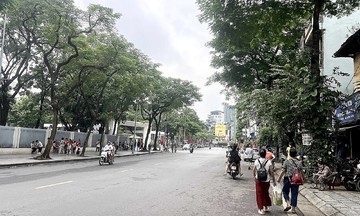The clinic quickly became a viral sensation on social media, attracting over 100,000 interactions. Just days after its launch, a post about the clinic garnered tens of thousands of shares and comments on Weibo, sparking curiosity and discussion about workplace pressure.
The clinic expanded from the "hate school" model, originally designed to address academic pressure and emotional issues in children. Two months prior, following suggestions from parents who had brought their children for treatment, the hospital began offering services for adults.
 |
Signs for the "hate school" (middle) and "hate work" (bottom) clinics in Hebei province, China. Photo: The Star |
Signs for the "hate school" (middle) and "hate work" (bottom) clinics in Hebei province, China. Photo: The Star
Doctor Yue Limin, director of the Sleep and Psychology Department, said many adults express feelings of "finding work meaningless" but are hesitant to seek treatment for anxiety and depression due to fear of stigma.
"We hope that by using this name, patients can enter the clinic without feeling pressured," she said.
Treatment begins with a psychological interview and health check to rule out physical causes such as thyroid disorders. Doctors then design individualized treatment plans based on each patient's condition.
According to Yue Limin, many seemingly physical symptoms actually stem from mental or social pressures, requiring a comprehensive assessment to address the root cause. Despite garnering nationwide attention, the clinic currently treats a limited number of patients.
On Chinese social media, many users expressed enthusiasm for the clinic's concept, calling it a helpful initiative.
 |
Illustrative photo. Photo: The Star |
Illustrative photo. Photo: The Star
Young people in China face increasing work pressure. A 2024 survey by the Chinese Academy of Social Sciences found that over 80% of workers under 35 reported frequent stress due to workload and expectations from superiors. Nearly 60% admitted to experiencing symptoms of anxiety or depression related to their work environment. This situation reflects a silent mental health crisis among young people, especially in major cities where a culture of long working hours and intense competition remains prevalent.
"Will a visit suddenly make patients love their jobs again?", one commenter asked, attracting over 1,000 likes.
Ngoc Ngan (The Star)












